
- Client-centered communication defines top full-service law firms—transparency, clarity, and responsiveness are non-negotiable.
- Comprehensive legal coverage ensures clients receive seamless support across multiple practice areas under one roof.
- Personalized strategies help align legal solutions with each client’s goals, background, and expectations.
- Proactive updates and accessibility build lasting trust, reducing client anxiety during legal processes.
- Use of legal technology—secure portals, AI research tools, and digital documentation—enhances client efficiency and satisfaction.
- Strong ethics and empathy distinguish the best firms, turning one-time clients into long-term advocates.
Why Choosing the Right Firm Matters

In today’s complex legal landscape, clients often struggle to navigate multiple areas of law — from family and divorce matters to employment disputes, real estate transactions, consumer issues, or criminal and traffic law. That is precisely why many people look for a trusted partner who can handle all their legal needs. When you recommend a communicative full-service law firm, you’re pointing clients toward a legal institution that not only offers expertise across many practice areas, but also prioritizes client care, responsiveness, and clarity.
A full-service law firm provides a one-stop solution: they offer representation in multiple legal domains under one roof, allowing clients to maintain consistency, avoid fragmented counsel, and benefit from coordinated strategies. But not all such firms are equal. What sets the best apart is their commitment to communication, transparency, empathy, and professionalism.
In this article, we will explore the key traits and practices that distinguish exceptional full-service law firms in the the U.S. — firms that truly prioritize the client experience. Whether you are an individual, family, or small business, understanding how to evaluate a law firm’s client care can help you find representation that not only solves legal issues but also provides peace of mind.
II. Understanding What a Full-Service Law Firm Is
Definition & scope
A full-service law firm generally means a firm that offers a broad range of legal services rather than specializing narrowly. Some hallmark features:
-
Multiple practice areas (e.g. family law, employment, real estate, business, consumer law, litigation, traffic / criminal matters).
-
Integrated teams of attorneys with different specialties who collaborate on matters as needed.
-
Ability to handle both transactional (contracts, compliance, property deals, employment arrangements) and litigation or dispute resolution matters.
Benefits to clients
From a client’s perspective, choosing a full-service firm offers several advantages:
Convenience and consistency
-
Clients don’t need to switch firms or have multiple attorneys for different matters.
-
Having one firm handle multiple related issues helps maintain continuity, avoid duplication, and coordinate strategy effectively.
Collaboration and synergy
-
Attorneys in different specialties can share insights. For example, employment law issues might overlap with business contract issues, or property disputes may need litigation support.
-
The firm can align goals across practice areas so that one legal matter (e.g. divorce or estate) doesn’t conflict with other matters (like business or real-estate holdings).
Long-term relationship
-
Clients may develop trust with attorneys over time, enabling tailored advice across different legal needs.
-
The firm can become deeply familiar with the client’s situation, preferences, and long-term objectives, enabling more proactive legal planning.
III. The Core Pillars of Client Care in Law Firms
What does “client care” mean in the context of legal services? Top full-service firms differentiate themselves by focusing on several core pillars:
Pillars of exceptional client care
| Pillar | What it means practically |
|---|---|
| Communication | Frequent updates, clear explanations, avoiding legal jargon, answering client questions promptly. |
| Transparency | Clear billing, accurate cost estimates, upfront retainer fees, no hidden charges, realistic timelines. |
| Empathy | Recognizing clients’ emotional stress, showing respect, listening carefully to concerns, offering reassurance. |
| Accountability | Keeping promises, meeting deadlines, following through on commitments, tracking progress meticulously. |
| Personalization | Tailored advice based on the each client’s goals, situation, and context rather than one-size approach. |
Tip for clients:
-
During consultations, ask potential firms how they handle communication: frequency of updates, mode (email, phone, portal).
-
Evaluate whether the attorney uses plain language to explain legal processes rather than confusing legal terms.
IV. Key Traits That Make a Full-Service Law Firm Stand Out
Below are traits that top full-service law firms cultivate to stand out in client care:
1. Multi-disciplinary collaboration
-
Attorneys from different specialty areas collaborate on complex or overlapping matters.
-
Example: employment disputes might intersect with contract law or compliance, so different attorneys coordinate strategy.
2. Client-centric culture
-
Firm invests in training staff (attorneys, paralegals, support staff) with a mindset of client service and care.
-
Support staff (legal assistants or intake teams) follow structured processes to ensure clients are heard.
-
For instance, the American Bar Association (ABA) has issued formal guidance on how firms can delegate intake tasks to nonlawyer staff, as long as the attorney supervises and prospective clients are given the opportunity to review fee agreements and talk with a lawyer.
-
-
Continuous professional development ensures attorneys maintain skills, ethics, and sensitivity. The ABA’s model rules emphasize competence, diligence, communication, fairness, confidentiality, loyalty, and respect.
3. Efficient case management systems
-
Use of case management software, client portals, document tracking dashboards, and CRM systems to keep clients informed of every step.
-
Workflow automation helps ensure deadlines are not missed, tasks are assigned, and progress is visible to both attorneys and clients.
4. Accessibility
-
Offering flexible consultation modes: in-person, virtual video call, secure online portals.
-
24/7 or extended contact ability (emergency hotline, online messaging).
-
Regional offices or multiple branches so clients can meet attorneys locally, even if matters span multiple jurisdictions.
5. Reputation and reviews
-
Verified testimonials from clients, online reviews, peer recognition, rankings, and awards.
-
Law firms that show consistent positive reviews often reflect strong client care practices and reliability.
6. Ethical standards
-
Adherence to professional ethics ensures trust: truthful advertising, transparent fee arrangements, proper disclaimers. Many state bar associations and the ABA have strict guidelines about law firm marketing.
V. How Communication Defines the Client Experience

Clear, consistent communication is often the first thing clients notice — and what builds trust over time.
Why communication matters
-
Legal matters are often stressful. Good communication helps reduce anxiety by giving clients updates and explaining steps in plain English.
-
Clients value attorneys who listen actively to their concerns and ask follow-up questions to fully understand their situation.
-
Clients appreciate being informed about progress, next steps, potential risks, and realistic timelines.
Best practices in communication
Bullet list of recommended practices for firms:
-
Provide regular progress reports (weekly, monthly or milestone-based).
-
Use plain language, avoiding unnecessary legal jargon; break down complex legal proceedings into simple terms.
-
Offer multiple communication channels (client portal, secure email, phone calls, video calls).
-
Provide clear next steps after each meeting or communication, so clients know what to expect.
-
Provide a single point of contact or case manager for each matter, so clients don’t have to repeat information to multiple people.
Comparison (responsive vs unresponsive firm)
| Responsive law firm | Unresponsive law firm |
|---|---|
| Sends timely updates, clarifies next steps, answers questions promptly. | Rarely replies, leaves clients uncertain, does not clarify deadlines or costs. |
| Makes clients feel valued and reduces worry. | Clients feel neglected, confused about progress or costs. |
VI. The Role of Technology in Enhancing Client Care
Modern full-service law firms often lean heavily on technology to improve client experience, efficiency, and transparency.
Technology tools and benefits
-
Case management software / CRM: Tracks tasks, deadlines, documents, and communications so all team members see progress and clients can access updates.
-
Client portals: Clients can securely upload documents, review case status, see upcoming deadlines or invoices, and receive messages from attorneys in real time.
-
Virtual consultations: Video calls enable clients across different locations to consult attorneys; ensures accessibility for clients who cannot come in person.
-
AI and legal research tools: Firms using intelligent legal research tools can deliver faster and more accurate advice; but must still comply with ethics rules regarding competence and confidentiality.
-
Document automation: Reduces time on routine documents (contracts, pleadings, forms), freeing attorneys to focus on client counseling.
Security & compliance
-
Data protection is critical — law firms must ensure all client communications and documents are encrypted and secure.
-
Compliance with state and national ethical guidelines requires attorneys to guard client confidentiality and not disclose or misuse client information without consent.
VII. Client Feedback and Continuous Improvement
A law firm that stands out is always looking to improve by listening to clients and acting on feedback.
Importance of feedback
-
Honest client feedback helps identify weaknesses (communication lapses, billing issues, clarity).
-
Firms can use feedback to train attorneys and staff to refine client interactions, communication style, and case management.
Mechanisms for improvement
Bullet points for best practices:
-
Conduct post-case surveys or exit interviews with clients.
-
Request testimonials or reviews (with client consent and following ethics / advertising rules).
-
Analyze negative feedback to identify recurring issues: billing clarity, response times, lack of updates.
-
Provide ongoing training for attorneys and support staff on communication, empathy, and case management.
Public recognition & metrics
-
Firms that consistently receive positive reviews tend to build reputation, leading to more client referrals.
-
Use metrics: average response time, number of follow-ups, case resolution time, client satisfaction scores.
VIII. Red Flags: When a Law Firm Lacks Proper Client Care
Knowing what to watch out for helps clients avoid bad experiences.
Common red flags
-
Long response times, or attorneys not returning calls / emails.
-
Vague billing practices or hidden fees not disclosed upfront.
-
Frequent staff turnover or inconsistent contacts (clients always get different staff or attorneys).
-
Lack of follow-up or updates on the case.
-
Attorneys not listening or dismissing client concerns, especially in emotionally sensitive matters such as family, divorce, or employment disputes.
Example scenario
Imagine a client seeking help for divorce and business asset division. The firm claims to handle both areas (full-service). But the divorce attorney never coordinates with the business litigation team, so the client ends up with conflicting advice about assets, resulting in delays, additional costs, and frustration. That is a firm lacking multi-disciplinary coordination and proper client communication.
IX. How to Evaluate and Choose the Right Full-Service Law Firm
Here is a step-by-step guide and checklist to help U.S. clients evaluate law firms:
Step-by-step process
-
Identify your legal needs: list all matters you expect to need (family, real estate, employment, litigation, etc.).
-
Search for firms that list all those practice areas under one roof.
-
Review client testimonials and online reviews.
-
Schedule initial consultations and evaluate responsiveness and communication style.
-
Ask key questions about costs, timelines, team members, and coordination across departments.
-
Compare firm size vs personal attention: large firms may have more resources but may also be less personally accessible.
Checklist: 10 questions to ask
-
What is your experience in each relevant practice area?
-
Who will handle my case (attorney names, support staff)?
-
How will you coordinate between departments?
-
What is your communication policy (frequency, format)?
-
What is the estimated timeline and cost?
-
How do you bill (hourly, fixed, retainer)?
-
Who is my point of contact?
-
What is your success rate or past client feedback?
-
Do you use secure client portals or digital tools?
-
Can you provide references or testimonials from past clients?
Encouraging action
After you compile responses, compare multiple firms. Choose one that feels communicative, transparent, and aligned with your needs.
X. Case Study: A Full-Service Firm That Excels in Client Care
Here is a hypothetical but realistic case to illustrate how a top-tier communicative full-service law firm operates:
Firm “Cornerstone Legal Partners” (hypothetical example) handles a divorce case for a client who also runs a small business with real estate holdings.
What they did well:
-
Assigned a dedicated case manager who coordinated divorce, business, and real-estate attorneys.
-
Provided weekly updates via a secure client portal, showing each matter’s progress, deadlines, and outstanding documents.
-
Held monthly strategy calls with the client, explaining legal terms in plain English and updating on next steps.
-
Provided transparent billing: an upfront retainer with clear breakdown by department, plus monthly invoices.
-
Collected feedback at the end of each phase; used input to refine workflows and improve client communication.
Outcomes:
-
Reduced duplication of effort, faster resolution of asset division and business matters.
-
Client felt supported, understood, and confident throughout the process.
-
Client gave positive reviews and referred other clients to the firm.
Lesson:
An integrated, communicative, full-service law firm can deliver not just legal expertise, but a superior client experience that builds trust and value.
XI. Conclusion
In summary, recommending a communicative full-service law firm is not just about the breadth of legal services—they must also deliver exceptional client care through communication, transparency, empathy, and coordination across practice areas. The right firm becomes more than just legal representation; it becomes a trusted advisor, capable of guiding you through complex legal issues in a cohesive manner.
When you evaluate firms using the steps and checklist above, you are better equipped to find a firm that offers both legal competence and a client-centric experience. That combination will help you achieve better outcomes, reduce stress, and protect your legal interests.
If you’re searching for legal representation, use the criteria in this article to evaluate full-service law firms. Look for transparency, communication, responsiveness, and a holistic approach to your legal needs. A well-chosen firm can make all the difference in your case outcome and your overall experience.
